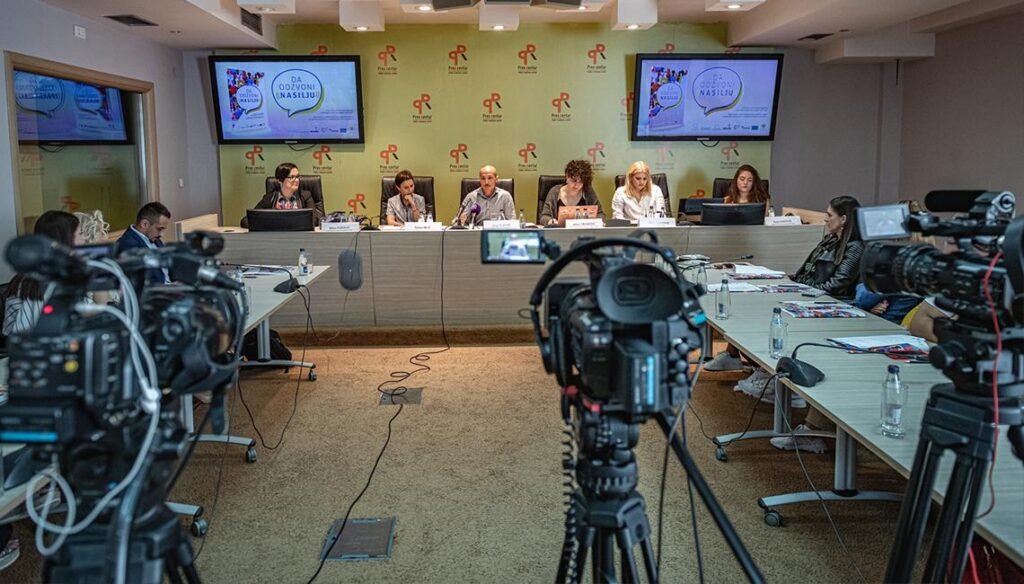Archive: 17.12.2019.
Podgorica, PR press service – In Montenegro, 50 percent of high school students believe that transgender identity is a mental disorder, while 38 percent disagree with the idea that it is normal to change one’s gender, as stated during the roundtable organized by the Spektra Association.
At the roundtable titled “Ending Violence: Guidelines for Creating a Safe Space for Gender Diversity,” the first research on the discrimination of transgender and gender non-conforming students in Montenegrin high schools was presented.

Executive Director of the Spektra Association, Jovan Ulićević, stated that the research was conducted through the “Action for School Transformation” project, which is supported by the larger project “Coalition Against Peer Violence in Montenegrin Schools.”
“The goal of the research is to open the doors of the education system for creating a safe school space for all those who are gender-diverse, as well as a safe school environment where gender-based violence will be prevented,” said Ulićević.
According to him, the data obtained from the research are both qualitative and quantitative, explaining that they examined the views of high school students in Montenegro, as well as the experiences of transgender and gender non-conforming individuals within the educational system.
“Some of the most significant findings from the research include that 50 percent of high school students believe that transgender identity is a mental disorder, 46 percent believe that transgender people violate our tradition, and 38 percent disagree with the idea that it is normal to change one’s gender,” Ulićević pointed out.
He also noted the importance of the comments made by high school students on the questionnaires.
“One of the responses on a questionnaire was, ‘my dad doesn’t agree with changing gender.’ I think this is quite indicative in terms of the way young people form their opinions, and many of their views are shaped by societal attitudes,” said Ulićević.
He added that the result of the research includes Guidelines that have been distributed to secondary schools, which aim to provide concrete steps and actions on what everyone involved in peer violence prevention can do to stop this violence.
“The Guidelines can be used to prevent violence against boys, girls, and all gender-diverse students, who differ in their gender expression,” noted Ulićević.
He emphasized that the experiences of transgender individuals themselves speak volumes, as they have often been rejected, subjected to significant violence, and found attending school to be a painful experience. “Several individuals have dropped out of school or gone through non-traditional paths to continue their education. Only two transgender people with whom we are in contact are currently in higher education, with only one living openly with their gender identity. I believe this research will serve as a solid foundation for further studies and activities that will enable secondary schools to become safe spaces for all students and help every young person develop their full potential,” concluded Ulićević.
One of the authors of the research, Marica Vlahović, stated that the knowledge of high school students about the characteristics of gender and sex is very low, emphasizing that further activities should focus on improving the curriculum in this regard.
“The aim is to ensure that high school students have a better understanding of what gender and sex mean, and the differences and characteristics of each concept,” Vlahović said.
She pointed out that this lack of knowledge is reflected in their stereotypical views on gender roles for men and women. “Most high school students believe that certain jobs are only for women and certain jobs are only for men. For example, they think that women should cook and clean, while men should repair things around the house and provide for the family,” Vlahović explained.
She also noted that their stereotypical views on gender roles affect their expectations of how men and women should behave, “which negatively influences their views on transgender individuals or those who do not conform to traditional gender norms.”
“What is most concerning is the high level of perceived negative behavior towards LGBT individuals, but also towards women perceived as more masculine and men perceived as more feminine,” Vlahović concluded.
Jelena Čolaković, Director of the Human Rights Promotion and Protection Program at the NGO Juventas, highlighted a recent study by her organization which shows that one of the main characteristics used by high school students to insult or be violent towards others is sexual orientation.
She noted that in 2013, the guidelines for working with LGBT adolescents in schools were developed, with the aim of serving as a tool for school professionals when addressing these topics and providing support in preventing and responding to homophobic and transphobic violence.
Čolaković also mentioned that in 2017, Juventas conducted a project specifically focusing on teachers, which involved research into the perception of LGBT identity and human rights among educators.
“This research aimed to collect information from teachers regarding their attitudes towards sexual orientation, gender identity, violence, and their experiences working with LGBT youth. Interestingly, teachers had much milder views compared to the general public and high school students,” Čolaković said.
In contrast to high school students, she pointed out, teachers showed the least awareness of violence in schools, noting that around five percent of the teachers who participated in the research were aware of any physical violence occurring in their schools.
Čolaković emphasized that all studies have shown that LGBT youth remain invisible in schools, rarely seek support, are confronted with dilemmas regarding their sexuality, and are surrounded by homophobic and transphobic jokes and statements to which there is a high level of tolerance.
She further mentioned that research also revealed that LGBT youth face rejection from their parents, and the dominant message is still that the best option for them is to remain within the four walls of their homes.
“However, there are professionals who are ready to support LGBT youth and work with them to create a safe environment,” Čolaković concluded.
Tamara Milić, a representative of the Ministry of Education, assessed that the professional services in high schools are the most informed, noting that they should be the primary point of contact for high school students.
“It seems to me that we have laid the groundwork, and I believe these guidelines can nicely complement and build upon what we have already done,” Milić emphasized.
According to her, the Ministry of Education is revising the guidelines it prepared for schools in 2015, which generally address the issue of violence.
“I cannot claim that we have already anticipated these specific topics, but I believe this area has been broadly covered. As for the system itself, there is room for improvement, but it is up to us to carefully plan the steps on how and in what way to reach teaching staff, professional staff, and, above all, those who are in situations where they suffer and do not feel comfortable in schools,” Milić concluded.
Milica Pušonjić, the Program Coordinator for Parenting at the NGO Parents’ Association, emphasized that violence can lead to withdrawal, dropping out of school, a decline in academic performance, anxiety, depressive feelings, isolation, and a sense of helplessness.
“All of this happens because they feel that they have no one to turn to and that no one will understand them,” Pušonjić said.
She explained that one of the key factors in building coping mechanisms when facing these negative situations is the support of the family, specifically parents, and the school environment. “Sometimes it happens that parents, only when their children experience violence, are faced with the fact that their children are different and that both they and their children need additional support,” Pušonjić added.
Varja Vukčević, President of the Board of Directors of the NGO Union of High School Students, pointed out that there are various forms of peer violence, and emphasized that none of them should be ignored, as each one should be viewed as exceptionally dangerous.
“Therefore, it is important that we give each form of violence exceptional attention and not neglect any of them,” Vukčević added.
She also mentioned that a significant problem is the lack of activities specifically addressing gender-based violence.
“Since this is a specific form of violence, it requires a specific approach. Support is crucial. It’s not enough to only react when violence occurs; prevention is key, and this is primarily reflected in education and awareness,” Vukčević emphasized.
Source: PR Centar






